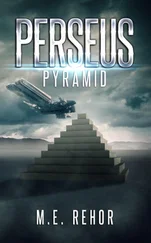“From the very outset,” Hiebermeyer said. “They weren’t going to go public without my approval.”
Jack took a deep breath. “Okay. You did the right thing. You’d think by now I’d have learned to let IMU sail on without my hand always at the helm, but sometimes it throws me. Now, where’s Lanowski? If the Seaquest team is on hold with the sarcophagus and I can hitch a lift back with him after visiting Cairo, I might even get a look-see at the raising after all.”
Hiebermeyer gestured with his thumb. “Down the corridor. He’s set up his simulation computer in my office.”
“What on earth is he doing with that?” Jack said.
Hiebermeyer gave a tired smile. “You know Lanowski. He says that when his feet hit Egyptian soil, he gets so wired that he can fly through the past and see every detail as if it’s laid out in front of him. I told him what you and Costas have been up to in the Gulf of Suez. I’ve never seen anyone so hyped. He’s simulating the Bible.”
Costas coughed. “Say again?”
“Simulating the Bible.”
“Simulating the Bible,” Costas repeated, shaking his head. “Isn’t that flying a little close to the sun? You know, the big guy in the sky?”
“That’s Lanowski for you,” Hiebermeyer said. “Boundaries are there to be crossed.”
“God help us,” Costas muttered.
Aysha stood up, glancing at her watch. “No more than an hour. Maria’s expecting you in the Old City of Cairo at 1900 hours.”
“Maria,” Jack exclaimed. “So that’s who you mean about people working behind the scenes. What’s she doing here?”
“I was going to mention it before we left, of course,” Aysha said. “Remember, she’s director of the Institute of Paleography at Oxford. Who better to study a new document from the Cairo Geniza?”
“And Jeremy too?”
She shook her head. “He’s just been appointed assistant director, so he holds the fort while she’s gone. Anyway, he’s in London at the British Museum doing some other research for this project that you don’t yet know about.”
Jack put up his hands. “I surrender. It sounds as if my world really has spun out of my control.”
Costas slapped him on the shoulder. “It’s what friends are all about, Jack. Sometimes you just can’t manage it all on your own.”
Jack stood up and put his hands on his hips. “All right. Lanowski first, then Cairo. And then we’ll see what happens. We could be back to Seaquest for another dive to a thousand meters in a submersible.”
“I’m good with that,” Costas enthused. “ Very good.”
Aysha checked her phone. “I’m going ahead to Cairo. Before you think of planning ahead, wait until you see what Maria and I have to show you. Your quest for Akhenaten’s City of Light might not be over just yet, inshallah.”
Jack glanced at Costas. “Let’s move.”
“Roger that.”
Jack and Costas made their way along the lower floor of the institute to the director’s office, its door slightly ajar. Hiebermeyer preferred the workroom where they had met him, so he usually lent his office to a visiting scholar, and there was one in there now. Costas had wanted to capture an image of Lanowski hard at work for the IMU Facebook page, and had his phone at the ready as he gently pushed the door open.
Lanowski was occupying Hiebermeyer’s desk. More accurately, he was perched on it, legs crossed, arms resting on his knees in the lotus position, eyes tightly shut, humming to himself and occasionally uttering a surprised chortle, as if in a state of constant revelation.
Costas took a picture. “Look, Jack,” he whispered. “He’s gone archaeologist.”
“What do you mean?”
“Ever since we let him take these little sabbaticals out of the lab, he’s tried to become one of us. Check out the boots and shorts. He’s copying Maurice. Sweet, isn’t it?”
Jack scratched his chin, trying to keep a straight face. “Doesn’t really work, does it?” He stared at Lanowski, at the long, lank hair hanging over the little round glasses, the mouth in a half smile of apparently joyous discovery, seemingly oblivious to them. Lanowski had looked exactly the same since they had poached him twelve years earlier from MIT to help Costas develop strengthened polymer materials for submersibles casings. Since then he had become IMU’s all-round genius, with a particular knack for computer-generated imagery, or CGI. He was here because a childhood fascination with the mathematics and geometry of ancient Egypt had led him to work closely with Hiebermeyer, a relationship that Jack had been happy to foster and that seemed all the more precious now that the institute was threatened with imminent closure.
Costas coughed, and tapped the door. “Jacob, what are you doing?” There was no response, so he tried again, louder this time. “Ground control to Dr. Lanowski. Come in.”
“I’m conducting a thought experiment,” Lanowski replied quietly, his eyes still shut. “Come, take a voyage in my mind.”
“You must be joking,” Costas exclaimed. “Real life with IMU is enough of a trip as it is.”
“A thought experiment ,” Jack said.
“Like Einstein,” Lanowski replied. “He used to spend hours imagining he was sitting on a particle of light flying through the universe.”
“The theory of relativity?” Costas said. “Are you developing a better one?”
Lanowski suddenly opened his eyes, stared at them, and threw himself off the desk, stumbling toward the computer workstation on the far side of the room. He pulled up the chair and began working the keyboard with one hand, the other hand clicking the mouse. “I wasn’t riding a particle of light,” he said, his eyes darting over the CGI image he was creating. “I was riding a chariot. To be precise, an ancient Egyptian chariot, at thirty miles an hour on the desert beside the Gulf of Suez, on the twenty-second of March 1343 BC at 0645 hours. The year is a best-fit during Akhenaten’s reign; the month seems plausible, before the hot season, and the time of day just after dawn is right for an attack.” He glanced at Costas, who had come up alongside and was staring at the screen. “The only part that’s complete guesswork is the day of the month, and to conduct a thought experiment in the past you need a precise day and time.”
Costas nodded thoughtfully. “I get that.”
Jack came up on the other side. “I gather Maurice has told you about our discovery.”
Lanowski stopped typing and punched the air. “I’ve got it.”
“Got what?” Costas asked.
“Solved the Bible.”
“Solved the Bible?”
“Book of Exodus, chapter fourteen. ‘And the children of Israel went into the midst of the sea upon the dry ground: and the waters were a wall unto them on their right hand, and on their left.’ That’s the King James Version, right? Well, I’ve checked the original Greek with your old mentor at Cambridge, Professor Dillen, and he thinks it allows for some latitude in translation. I know Aysha’s been talking to you about the Cairo Geniza, Jack, because she told me what she has in store for you. Dillen also brought up the Geniza when we talked about the problems of translation. One of the greatest discoveries in the Geniza has been original Hebrew pages of the Ben Sira, the Book of Wisdom from the second century BC previously known only from its Greek translation. He said that seeing those original pages and then comparing the Greek, the Latin, and the English versions has made him think again about the huge problem of conveying exact meaning through languages that simply don’t have the appropriate words or expressions, resulting in translations that are either inaccurate or too obscure to understand without a mediator. He thinks the original Hebrew of the scriptures was meant to be clear and precise and to not require a priestly interpreter, and that the development of a priestly class was actually a consequence of the written word becoming too baffling in its transmission for people to understand.”
Читать дальше












